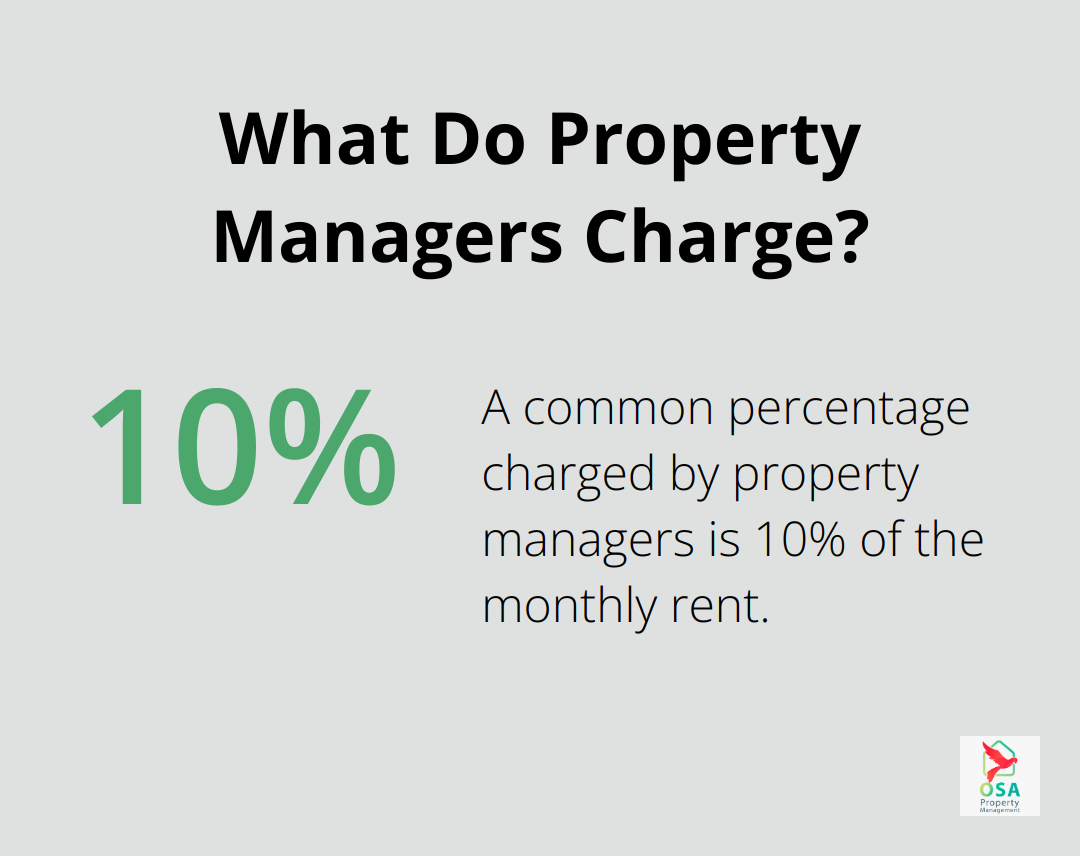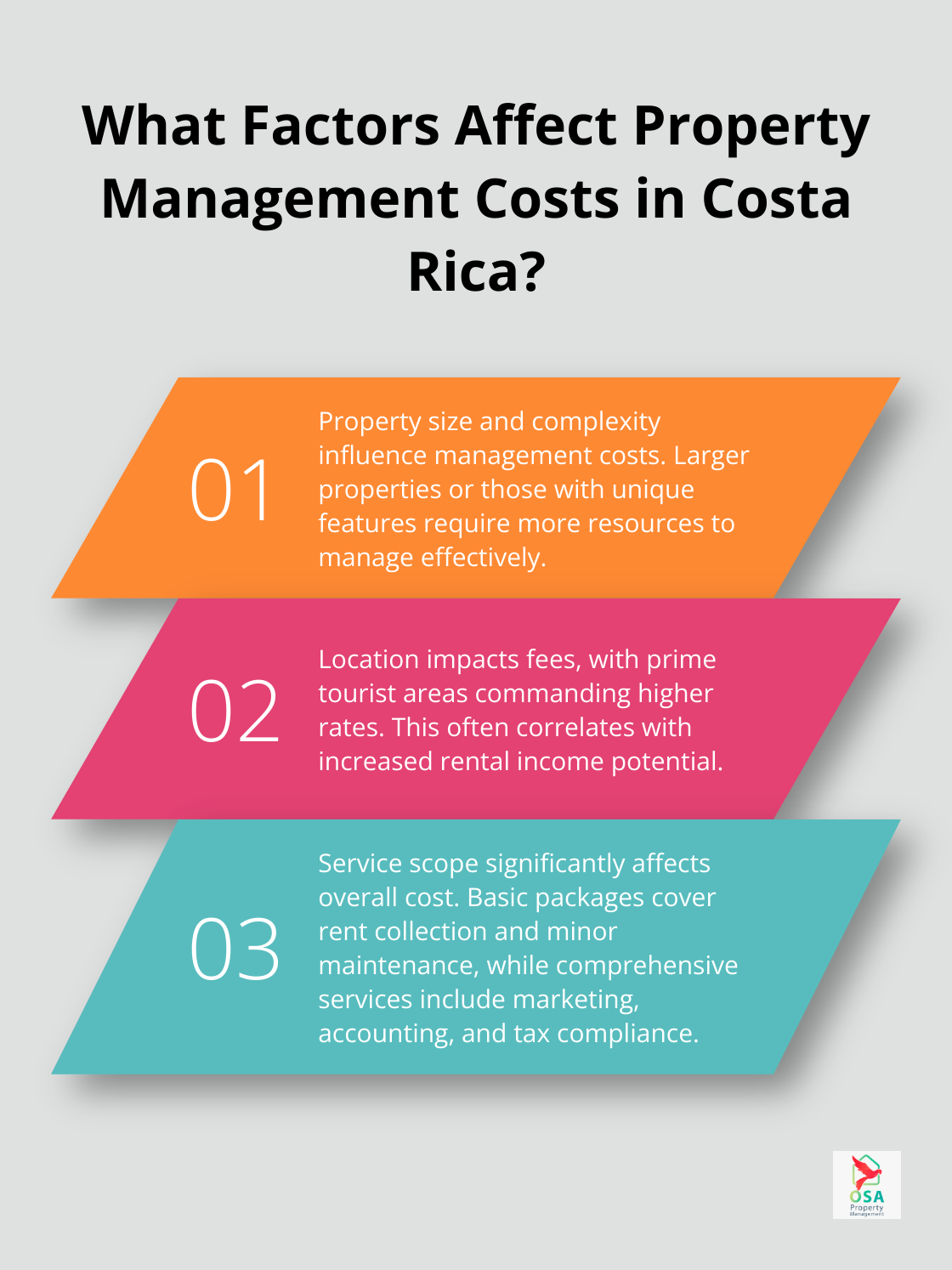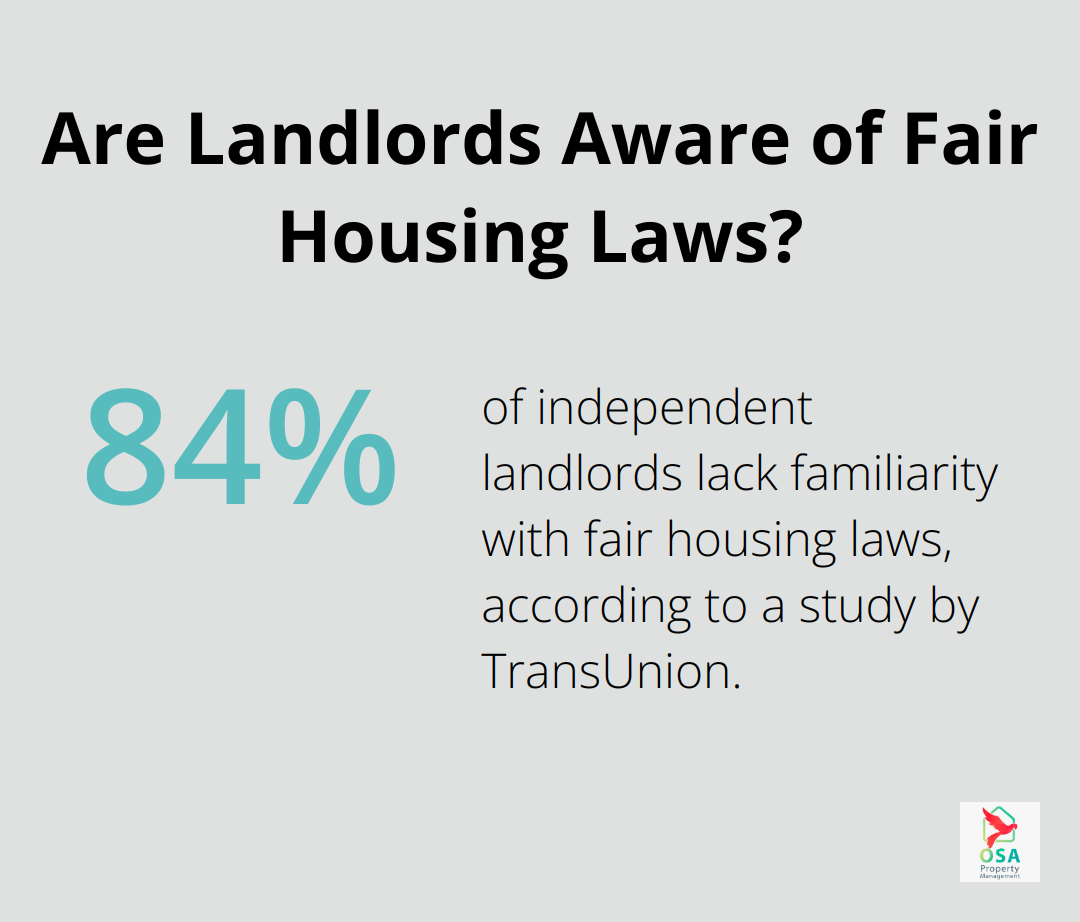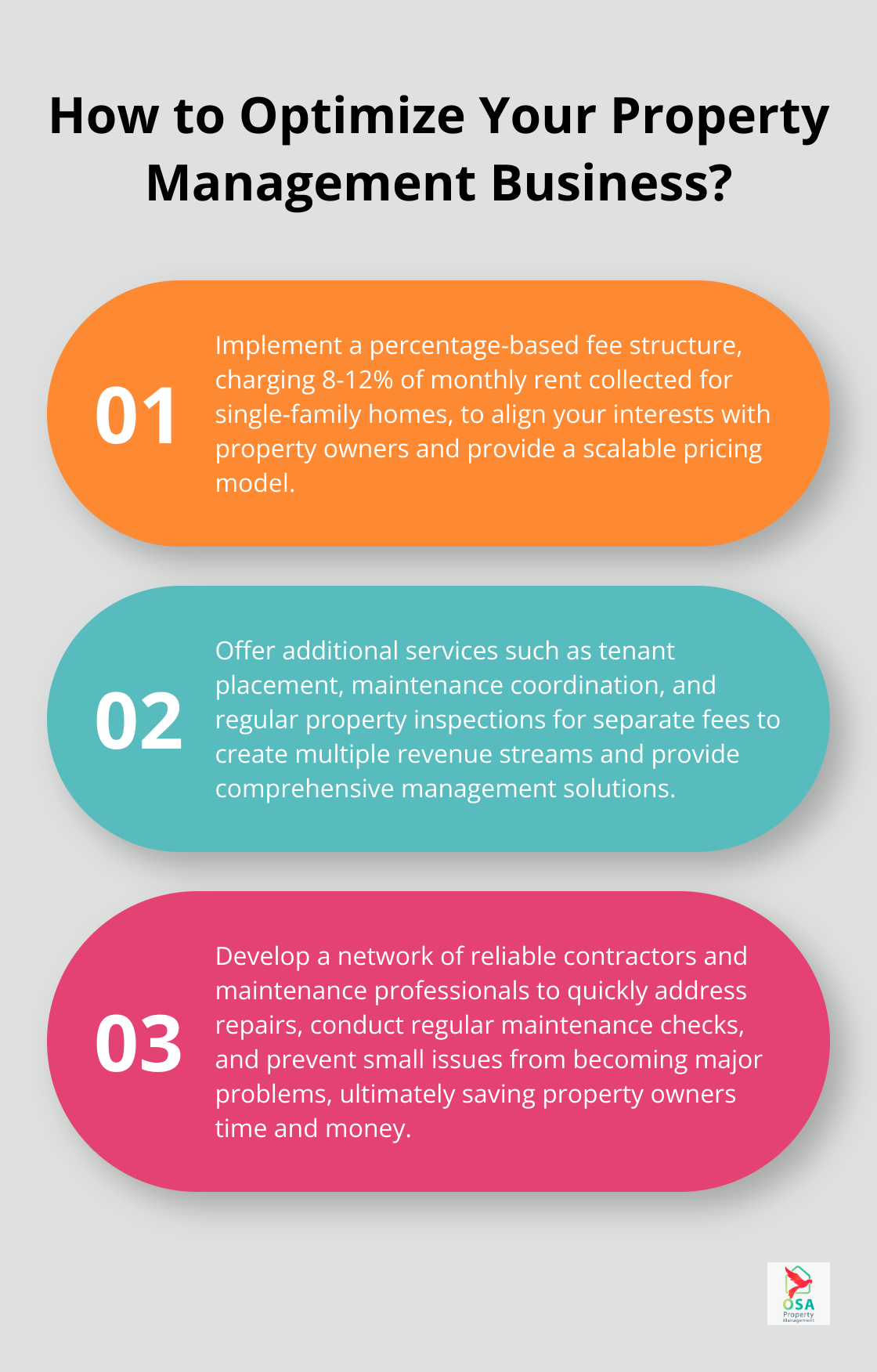At Osa Property Management, we understand that rental property management costs are a crucial consideration for property owners.
Navigating the world of property management fees can be complex, with various pricing structures and services to consider.
In this post, we’ll break down the typical costs associated with professional property management and explore the factors that influence these expenses.
What Are the Average Costs of Rental Property Management?
Property management fees vary widely, but understanding typical costs helps property owners budget effectively. We’ll break down the most common fee structures in the industry.
Percentage-Based Fees
The most prevalent fee structure in property management is the percentage-based model. Property managers typically charge 4% to 12% of the monthly rent, with 10% being common. For instance, if your property rents for $1,500 per month, you might pay between $60 to $180 in management fees.

This model aligns the property manager’s interests with yours, as their income increases when your rental income does. It’s important to clarify whether the percentage is based on rent collected or rent due, as this can significantly impact your costs.
Flat-Rate Management Fees
Some property management companies offer flat-rate fees, which can benefit high-rent properties. These fees often range from $100 to $200 per month for single-family homes (regardless of the rental amount). This structure provides predictable expenses and can prove more cost-effective if your property commands high rent.
Additional Costs and Services
Beyond the basic management fee, property owners should consider several additional costs:
- Leasing fees: Many companies charge a separate fee for finding and placing tenants.
- Maintenance fees: Some managers charge a markup on maintenance costs (often around 10% of the repair bill).
- Vacancy fees: You might incur a reduced fee during periods when your property is unoccupied.
- Eviction fees: If tenant eviction becomes necessary, expect to pay around $500 plus legal fees.
- Inspection fees: Regular property inspections might incur additional charges (usually between $50 to $100 per inspection).
When considering property management services, property owners should request a comprehensive breakdown of all potential costs. This information allows for an informed decision about which fee structure and service package best suits their rental property investment strategy.
The next chapter will explore the various factors that influence property management costs, providing a deeper understanding of why fees can differ significantly between properties and locations.
What Drives Property Management Costs?
Property Complexity and Size
The complexity and size of a property directly influence management costs. Larger properties or those with unique features require more time and resources to manage effectively. This guide breaks down the typical fee structures, factors influencing costs, and services included in property management fees for Costa Rica property owners.
Location and Market Dynamics
Location plays a crucial role in determining property management costs. In prime tourist areas, where rental demand is high and properties command premium rates, management fees may be higher. This often correlates with the potential for increased rental income. Conversely, in less touristy areas, fees might be lower, but so might the rental income potential.

The local real estate market also impacts costs. In competitive markets, property management companies may adjust their fees to stay competitive, while in markets with fewer options, fees might be higher due to limited competition.
Scope of Services
The range of services included in a management package significantly affects the overall cost. Basic packages might cover only rent collection and minor maintenance coordination, while comprehensive services include marketing, concierge services, bill payments, accounting, and tax compliance.
Professional property management services in Costa Rica can be particularly valuable when it comes to handling the complexities of rental income reporting. These experts can help navigate the intricacies of local tax laws and reporting requirements.
Occupancy Patterns and Tenant Turnover
Properties with high occupancy rates and long-term tenants generally incur lower management costs. Frequent tenant turnover necessitates more work in terms of marketing, screening new tenants, and preparing the property between rentals. In Costa Rica’s vacation rental market, properties in areas with more consistent, long-term rentals might see potentially lower management costs compared to high-turnover vacation rentals in busier tourist hubs.
Understanding these factors helps property owners make informed decisions about their management needs and budget accordingly. While it’s tempting to focus solely on the lowest cost option, it’s important to consider the value and potential return on investment that comprehensive, quality management services can provide. In the next section, we’ll explore how to conduct a cost-benefit analysis when considering hiring a property manager.
Is Hiring a Property Manager Worth It?
Time Savings for Property Owners
Property owners often underestimate the time commitment required to manage a rental property effectively. While specific data on time spent managing rental units is not available, property management can be a significant time investment, especially for those with multiple properties or full-time jobs.

Professional management eliminates these time-consuming tasks, allowing owners to focus on other investments or personal pursuits. For many, this time savings alone justifies the cost of professional management.
Potential for Increased Rental Income
A skilled property manager can often boost your rental income. While specific data on rent differences between professionally managed and self-managed properties is not available, professional management can potentially lead to increased rental income through:
- Market knowledge: Property managers possess in-depth understanding of local markets and can price your rental competitively.
- Efficient marketing: Professional listings and targeted advertising reduce vacancy periods.
- Timely rent collection: Consistent, professional rent collection processes result in fewer late payments.
These factors can lead to increased rental income that offsets (or even exceeds) the cost of management fees.
Reduced Legal Risks and Compliance Issues
Navigating the complex landscape of rental laws and regulations challenges many property owners. A study by TransUnion found that 84% of independent landlords lack familiarity with fair housing laws. This knowledge gap can lead to costly legal issues.
Professional property managers stay current with local, state, and federal regulations, ensuring your property remains compliant. This expertise can save you from potential fines and legal fees that far exceed the cost of management.
Professional Marketing and Tenant Screening
Effective marketing and tenant screening play a critical role in successful property management. Professional managers employ targeted marketing strategies to attract high-quality tenants quickly. They also conduct thorough background checks (including credit, employment, and rental history) to select reliable tenants.
This professional approach to marketing and screening can significantly reduce vacancy periods and minimize the risk of problematic tenants, ultimately protecting your investment and maximizing your returns.
Expert Maintenance and Repairs
Professional property managers have established relationships with reliable contractors and maintenance professionals. This network allows them to address repairs quickly and cost-effectively. Regular maintenance checks (often included in management services) can prevent small issues from becoming major, expensive problems.
For property owners who live far from their rental properties or lack the time and expertise to handle maintenance issues, this aspect of professional management proves invaluable.
Final Thoughts
Rental property management costs vary widely, typically ranging from 4% to 12% of monthly rent for percentage-based fees or $100 to $200 for flat-rate structures. These costs depend on factors such as property type, size, location, market conditions, and the scope of services provided. Additional expenses like leasing fees, maintenance costs, and vacancy fees can also impact the overall management budget.

The value of professional property management often outweighs the initial expenses. Professional managers bring market knowledge, efficient marketing strategies, and thorough tenant screening processes that can lead to higher occupancy rates and more reliable tenants. Time savings, potential for increased rental income, reduced legal risks, and expert maintenance contribute to the long-term benefits of hiring a property manager.
For property owners in Costa Rica who seek professional management services, Osa Property Management offers expert solutions tailored to the unique needs of the region. With extensive experience and a comprehensive range of services, they provide peace of mind and cost-effective management for property owners in areas like Tarcoles, Jaco, Dominical, Manuel Antonio, Ojochal, and Uvita. Property owners should base their decision to hire a manager on a careful assessment of their individual needs, time constraints, and long-term investment goals.

